Delivering hope: Families share emotional journeys to parenthood in the midst of crisis
When Emily Scheer found out she was pregnant with her second child, she never imagined how dangerous it would be – giving birth in the middle of a global pandemic in New York City, the epicenter of the coronavirus in the United States.
“It’s been a really stressful pregnancy,” Scheer told “Nightline.” “Especially for New York City, as the cases rise and our due date nears, it's been pretty nerve wracking.”
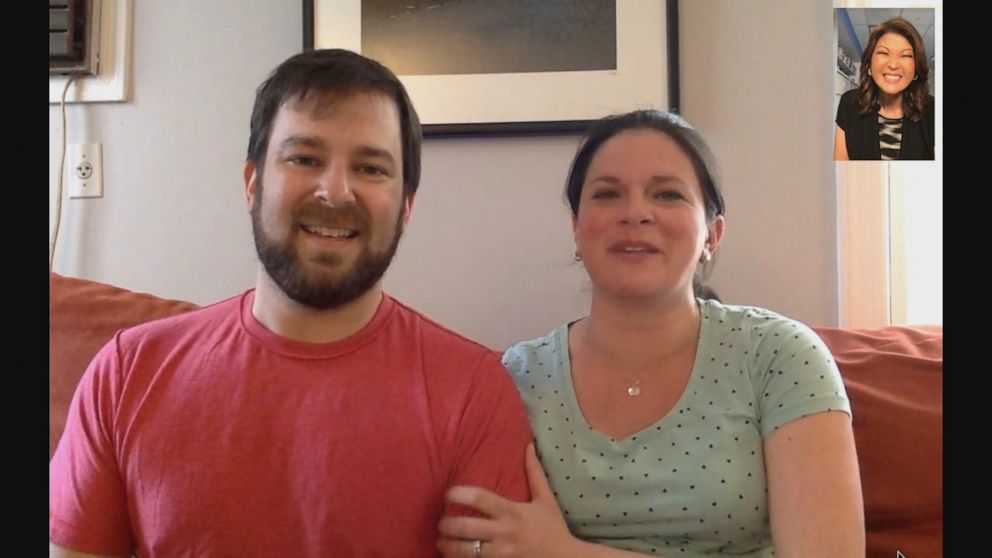
Millions of expectant parents are facing the same unforeseen risks as Scheer, navigating the complex emotional turmoil that comes along with the pandemic.
“Things are changing so fast and it’s hard to keep up,” expectant mom Rachelle Ocampo told “Nightline.”
“Will I have a bed? Will there be enough resources if something goes wrong? Will the nursing staff be too tired or overworked? Will any of the nurses be carrying the virus?” said Caitlin Henck, another mom-to-be.
“Like everything with coronavirus, everything is disrupted, nobody’s circumstances are special,” Natalie Jáquez, another expectant mother, added.
Rare but extreme cases of the virus infecting mothers and babies have made headlines. Angela Primachenko’s story of giving birth while battling COVID-19 in Vancouver, Washington, was one of them.
“I didn't realize that I had the baby,” she told ABC News. “I think it still doesn't feel real because I haven't held her yet.”
Primachenko didn’t meet her newborn daughter until two weeks after giving birth.
Four families navigating these fears took “Nightline” inside their journeys to parenthood amid a global crisis — sharing their experiences inside the delivery room and through painful separations and heartwarming reunions.
“Nightline” met Scheer, her husband, Billy Scheer, and their daughter Abigail at the height of the pandemic in New York City in late March — shortly after her hospital and several others throughout the city issued orders prohibiting spouses or any companion from being present at births in an effort to protect patients and staff.
“It was devastating hearing that I'd have to do this by myself. It's unimaginable. Unimaginable to me,” Emily Scheer said.
“It's really upsetting because I'm a man that likes to take care of his ladies,” her husband added. “I pride myself and take care of my lady. And I feel like I'm kind of letting them down by not being able to be there.”
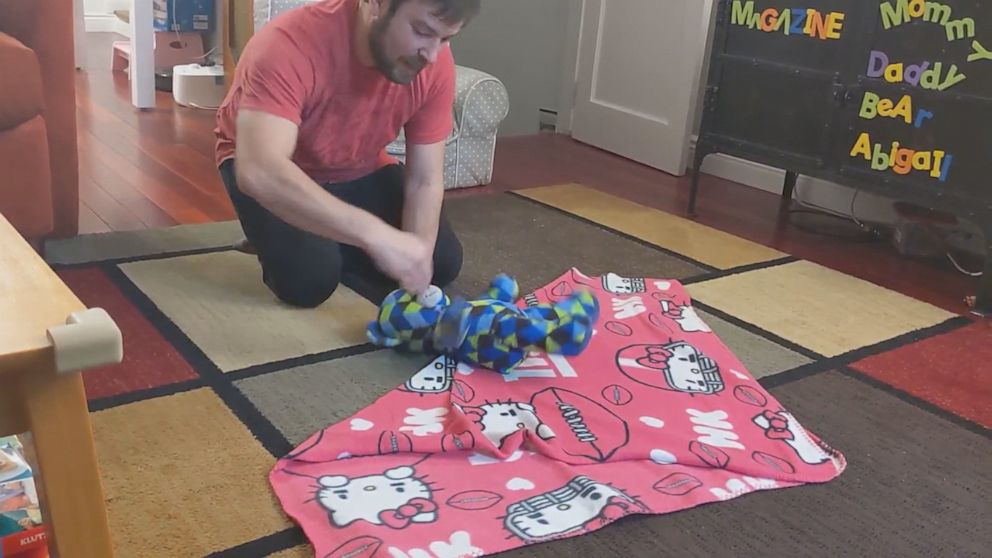
Emily Scheer said her biggest fear was that “in the biggest medical moment of my life, something goes sideways and I either can't make the decision and someone makes it for me and Billy’s not there to be part of it. I don't understand how he could possibly miss out on this moment in our child's life.”
Karli and Stephen DeFilippo moved from California to New York to have their first child, only to be blindsided with the news that the father wouldn’t be present for the birth of his son just days before he was due.
“It sucks… Then you start to understand why those restrictions were put in place,” Stephen DeFilippo said.
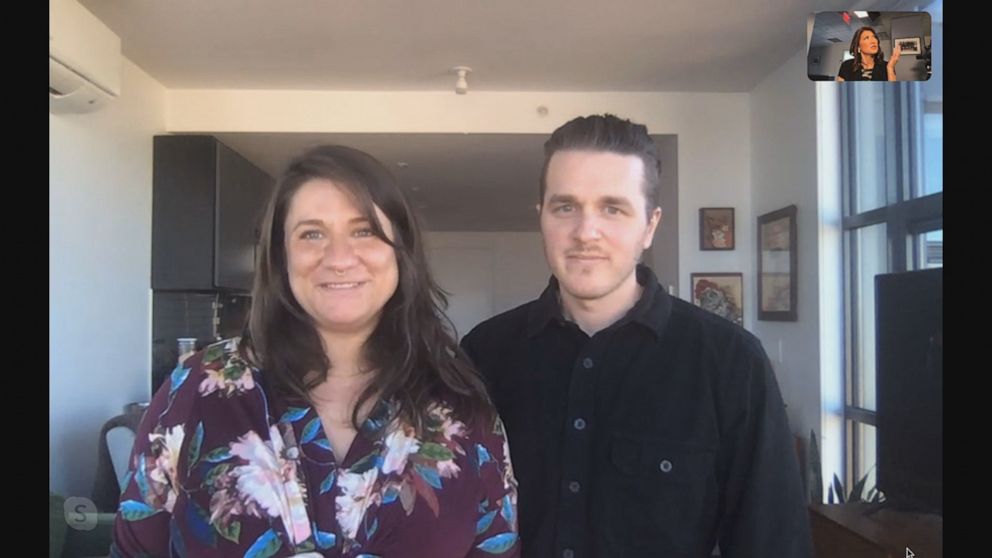
“I understand that these are very brave people with families and children of their own showing up [every]day,” Karli Defillippo added. “We're just really happy there was an alternate option for us.”
The expectant mother miraculously found a birthing center in Brooklyn, New York, that would accept her and allow her husband in. But there was a catch: she would have to give birth without painkillers. The center doesn’t administer epidurals and because it could spread the virus, no nitrous oxide.
Jeanelle Drysdale Miller and her husband, Warner Miller, had trouble finding alternatives to hospitals.
“I have called the Brooklyn midwives and a lot of them so far have said … ‘We're booked’ ... I haven't found one yet,” Jeanelle Miller told “Nightline.
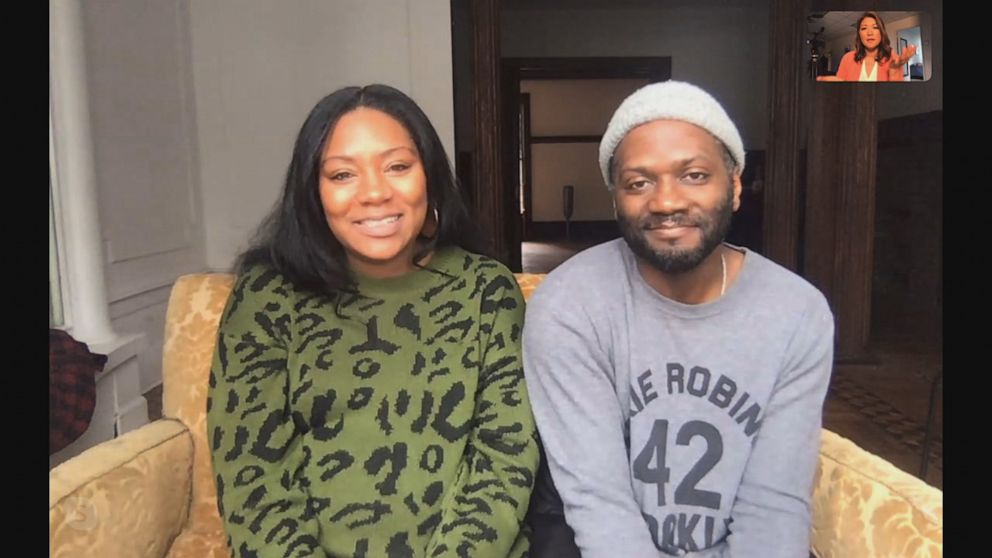
The Millers stocked their nursery with gifts but were unable to celebrate with a baby shower because of the pandemic.
The family is well aware of the fact that black women already face higher complication rates and maternal mortality than white women. According to the Centers for Disease Control and Prevention, black women are two to three times as likely to die from a pregnancy-related cause than white women.
“It's funny because that's the thing that was the number one concern, and now it's not. Now it's the pandemic; this virus,” Jeanelle Miller said. Jeanelle stopped working before the pandemic and now her husband, who starred in the Broadway show “A Soldier’s Story,” hasn't performed since theatres went dark.
“One of my biggest fears is going through all of this … and looking back on it and seeing how terrified or fearful I was that I didn't get the chance to really enjoy my wife, the birth of my child,” her husband added.
All these families can do now is hope for a change in policy, and that no one gets sick. For Emily Scheer, she says it feels like she and her husband, Billy Scheer, are “parachuting into what feels like a war zone.”
“[I] have this little tiny, fragile thing just getting out. The whole goal, Billy said, is just to get home,” she said.
On March 27, just six hours after her first interview with “Nightline,” Emily Scheer started having contractions and her husband was forced to drop her off at the hospital.
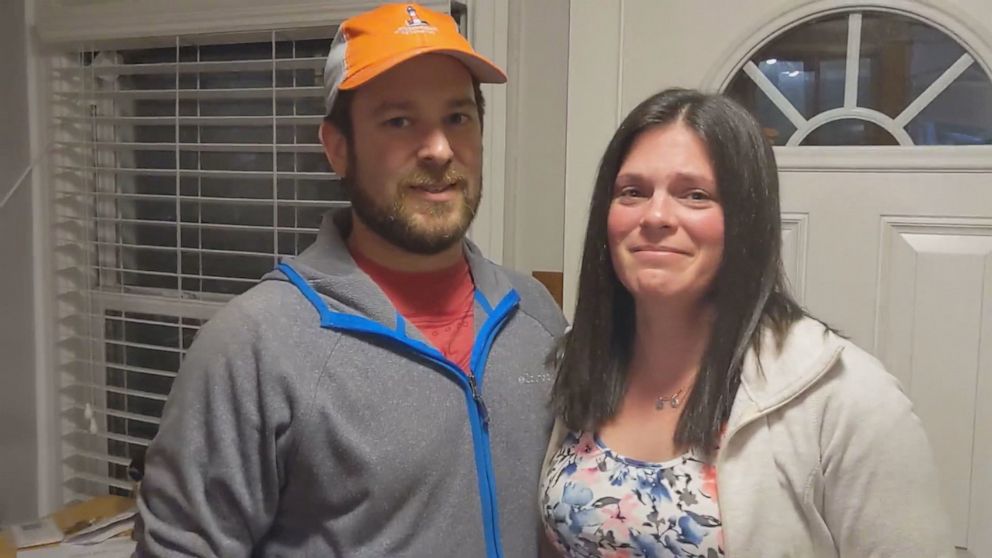
“He’s not coming up with me. He’s gonna drop me off, and I’m terrified,” Emily Scheer said in video diaries recorded for “Nightline.”
The couple was forced to FaceTime during labor while her husband sat in the parking lot, trying to stay as close as possible.
“She locked eyes with me while she was pushing those last few pushes through the screen,” Billy Scheer remembered. “Then, all of a sudden, the doctor says, ‘You go in and plop the baby right on her.’ And I just screamed, ‘Yes!’… I was just happy. There was nothing else to be. I knew my kid was out. I knew she was healthy. And my wife was OK. And that's all that mattered to me.”
The Scheers welcomed baby Sarah to the world in the early morning hours of March 28.
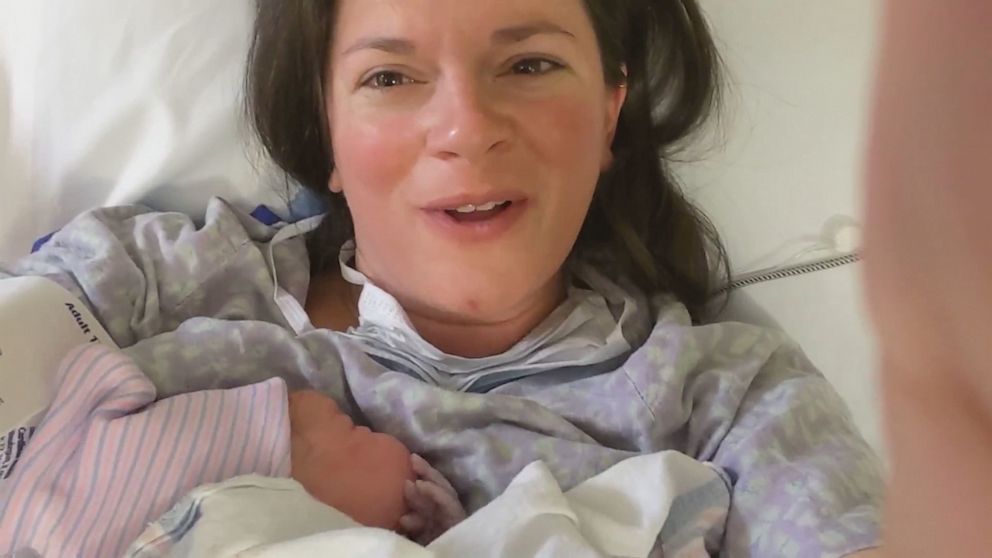
Trying to minimize the risk of exposure to the coronavirus, the hospital discharged Emily Scheer in the middle of the night.
“Well, [we’re] just waiting to get discharged… It’s 12 at night, baby’s just getting her final tests done,” Emily Scheer said in a video diary.
“The security guard looks at me and hands me a big bottle of sanitizer, gives me a couple of pumps and says, ‘Pick up your kid,’” Bill Scheer remembered. “I picked her up … and I was overjoyed.”
It was 2 a.m. when the new mom and baby were able to leave the hospital.
“You felt like you were escaping from the hospital … by cloak of night,” Emily Scheer remembered.
What the reunited family didn’t know was that Billy Scheer missed out on the birth of his daughter by just a few hours. New York Governor Andrew Cuomo had just ordered hospitals to allow one companion for labor and deliveries.
The DeFilippos heard about the order immediately and messaged their obstetrician.
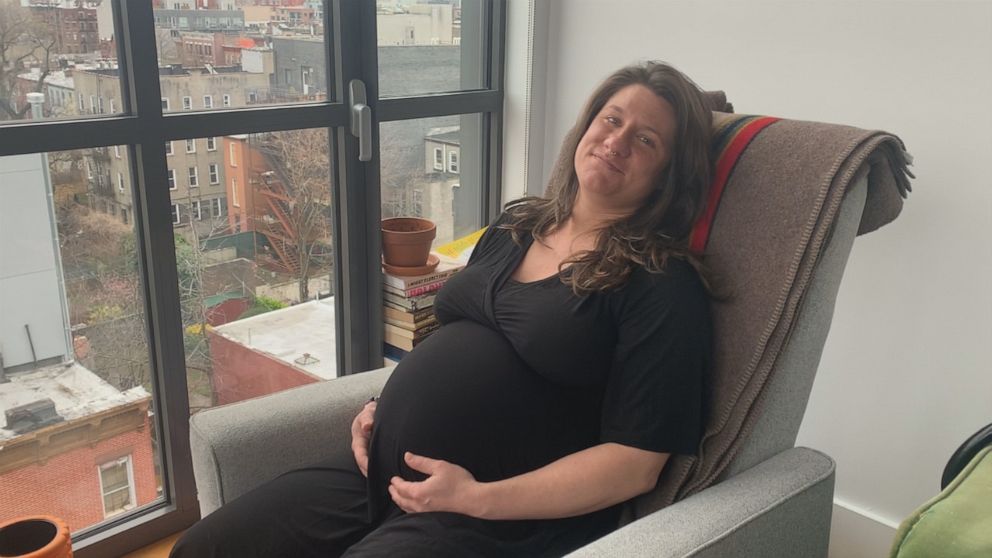
“I think we’re still apt to stay with the birthing center … just cause I’m sick of changing my mind a million times,” expectant mom Karli DeFilippo told “Nightline.”
Except, the days kept passing, and the baby wasn’t coming. Eleven days overdue, her blood pressure was elevated and she had no choice but to be induced at the hospital.
“The precautions were definitely what we expected,” she said, noting staff had donned full personal protective equipment. “My husband was in a head-to-toe-like gown — massive. They let me kind of intermittently wear a mask because as you can imagine, laboring with an N95 is not really possible.”
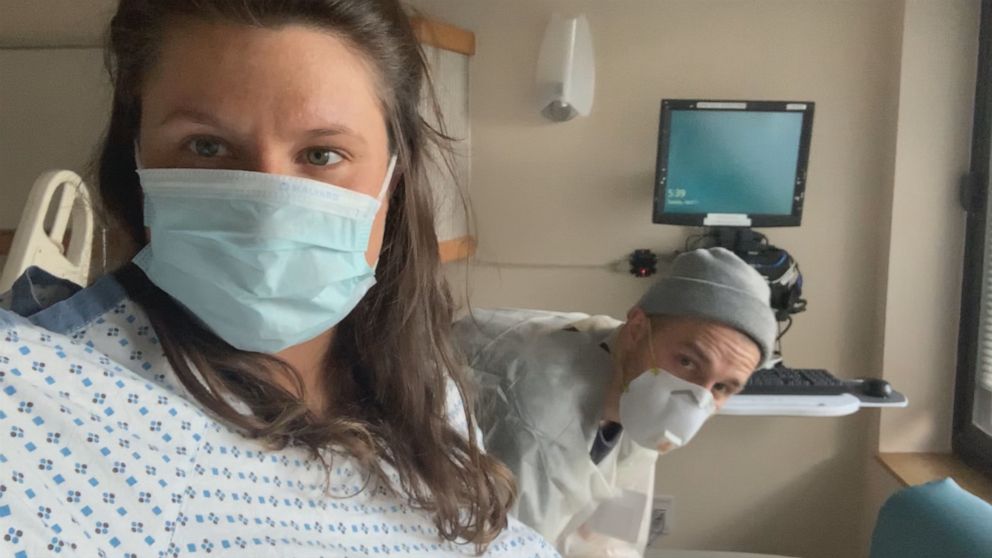
The couple welcomed baby Joaquin on April 8.
“The most exciting thing was right at 7:00 p.m., they did the cheer for all the health workers and this big shift change… And I was pushing him out like while that cheer was happening,” Karli DeFilippo remembered.
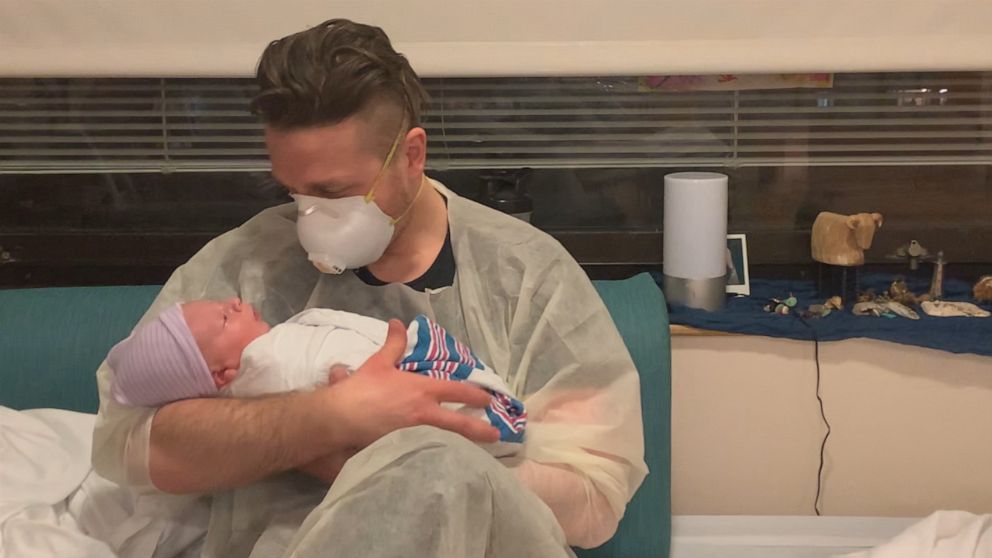
Stephen Defillippo witnessed his son’s birth, but he had to leave just a few hours later, again because hospitals were trying to limit exposure to the hospital staff and other patients in the postpartum unit. He couldn’t come back until his wife and their baby were discharged two days later.
The Millers’ experience was similar.
On April 20 at 1:20 a.m., Jeanelle Miller’s water broke. Her husband took her to the hospital together where they tested the expectant mother for COVID-19.
The couple leaned on each other during the delivery of their daughter, Amani.
“During labor, I had the mask on. Like, when I was pushing, I had the mask on. For the most part, I had the mask on,” Jeanelle Miller remembered. “When they turned [Amani] to me, her eyes were popping on her head. She was shocked. I was shocked. We were all shocked.”
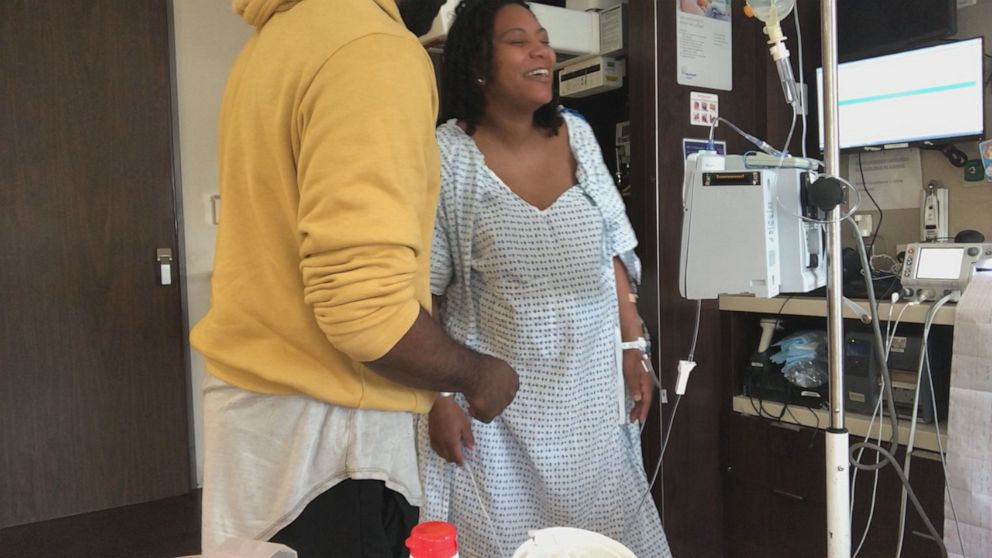
Warner Miller, an actor on Broadway, softly serenaded Amani with Stevie Wonder’s “You and I” -- Warner and Jeanelle’s wedding song.
Amani’s name in Swahili means “peace.” The couple hopes Amani’s birth will lift spirits and bring peace to others.
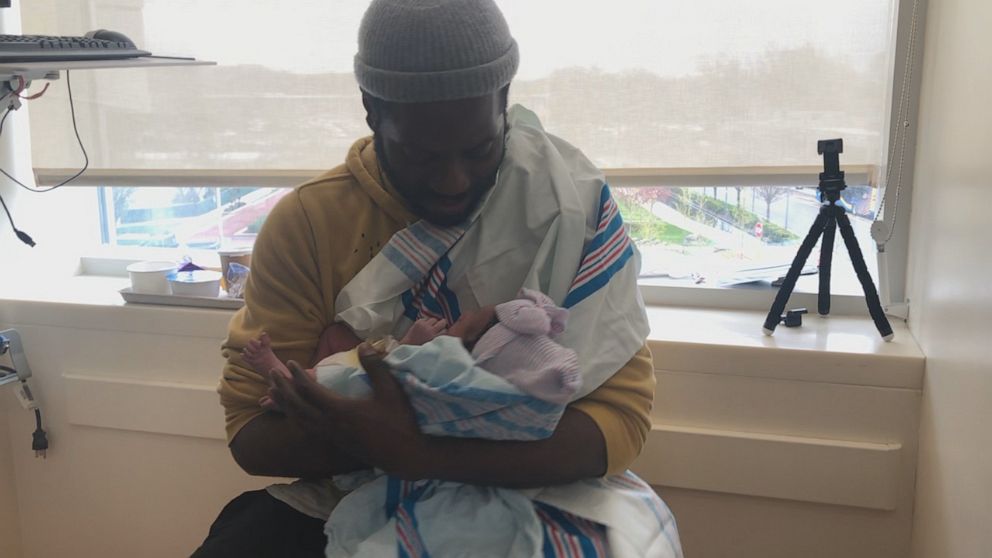
“We’ve had, you know, friends that have family members die from this virus or at least be hospitalized,” the new dad said. “I know I've gotten texts and calls from people saying that, you know, thank you for sending this, because this has really been a breath of fresh air.”
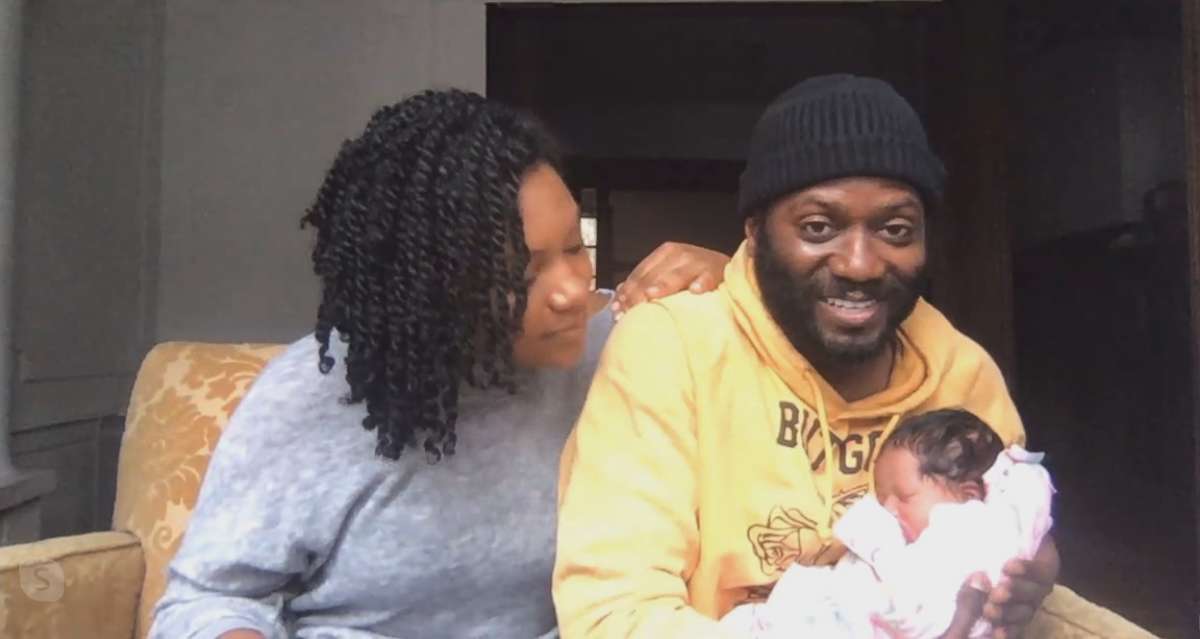
New parents Kiley and Gerald Fadayomi, of Atlanta, have been forced to coo at their newborn twin girls through a phone screen for weeks as the couple has been separated from their premature babies — a sad ripple effect of COVID-19.
“I don't feel like I truly have kids yet. Which is really hard,” Kiley Fadayomi told “Nightline.”
“I hate hanging up. They’re so cute,” she said in a video diary.
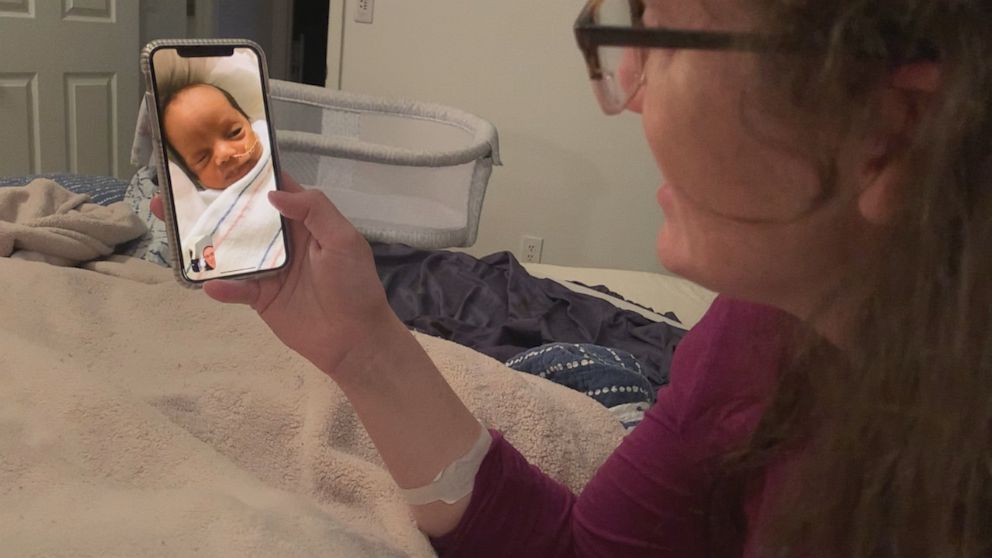
The couple has been married three years and children were always a part of their plan. They even prayed to have twins - they just didn’t realize how difficult their journey would be.
“Be careful what you pray for,” Gerald Fadayomi said. “We did not know … we'd give birth to twins in the middle of coronavirus.”
Kiley Fadayomi says her pregnancy was hard and that she spent time between bed rest and the hospital. But things took a turn in mid-March, when her husband returned from a work trip.
“I started not feeling well, had body aches, chills, a headache and a low-grade fever,” Gerald Fadayomi said.
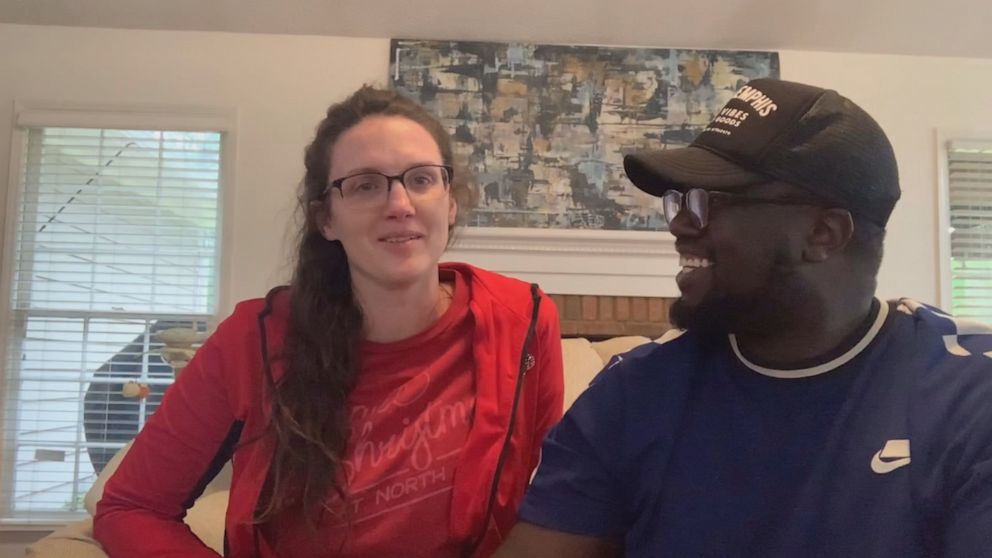
He was tested for COVID-19, but results would take days. Doctors wanted his wife to take the test, too, just to be safe. But at the hospital, her doctor had news.
“As soon as he checked me out, he said, ‘Well, the babies are coming in an hour or two’... I burst into tears,” Kiley Fadayomi remembered. “I was 33 weeks and four days. And with twins, every single day counts.”
“I’m on speaker with her as all this is happening and I’m like, ‘I’m coming right now,’” her husband remembered. “The doctor was like, ‘I’m not sure you’ll be able to come in,’ and I was like … ‘I don’t care, I’m coming.’”
As Gerald Fadayomi arrived in the parking lot, he received a phone call -- he said the woman on the phone sat and cried with him, even as she had to tell him he couldn’t come into the hospital because his test results hadn’t come back yet. His wife had to have an emergency cesarean section under anesthesia.
“I found out in my backyard — pacing around my backyard — that our twin girls had made it into the world,” he said. “They were safe. Our girls came into the world and neither of their parents were able to see them or hold them or be with them.”
“Waking up without the babies that I had carried for that seven-and-a-half months … it doesn't feel real,” Kiley said. “It feels like an unending nightmare, honestly.”
The girls were taken to the NICU, neonatal intensive care unit. The Fadayomis could not see or touch them until their COVID-19 tests came back negative.
They received confirmation that they tested negative two long days later.
“I can’t put into words how it feels to see the girls. It felt like a dream come true, but it also felt like they weren't ours,” she said. “That was the first time we'd seen [them].”
They named the girls Wesley Grace and Zoe Faith.
“We want our girls, when they get older, to walk the halls of their school and be the example of grace; people who care for those that others aren't caring for, and be an example of faith in believing that there's something bigger that guides them and carries them through,” Gerald Fadayomi said.
Just days later, as the outbreak spread, intensive care units nationwide started going into lockdown, including the NICU caring for Wesley and Zoe, which meant no visitors at all.
“I think it was a hurt from like, so deep down in your soul… It's hard to even try to put into words,” Kiley Fadayomi said. “I cried on the nurse's shoulder. She didn't have a mask on. She didn't have gloves. She didn't care. She let me cry on her shoulder and just reassured us that they would be caring for and loving on the girls as much as we would want to if we could visit them.”
That’s when the FaceTime calls started. The NICU nurses called the Fadayomis at least two or three times a day. Then, days turned into weeks.
“The nurses say that they're looking around and they can hear our voices, which is everything that you want to hear when you can't hold your babies, that we say that we recognize their voice,” Kylie said, tearful. “I'm really grateful for that. And for the nurses.”
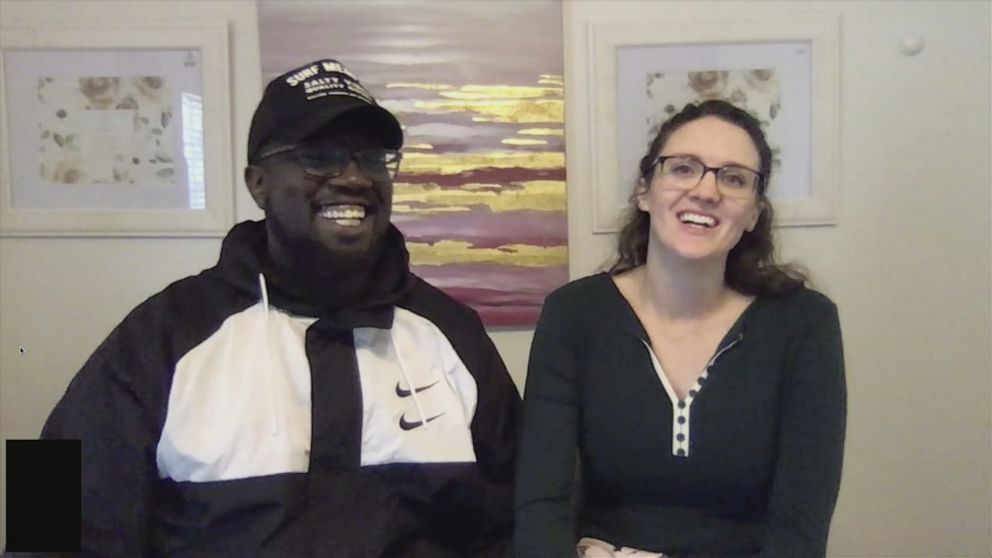
That bittersweet feeling came to an end on Easter weekend when the NICU lockdown was lifted.
“That’s the best phone call I’ve ever had,” Kiley Fadayomi said of learning she’d get to go see her children on Easter Sunday. It had been 21 days since they’d last seen their babies.
The couple documented the entire emotional reunion at the NICU for “Nightline.”
Kylie was so nervous, she was worried she couldn’t touch her children.
“Of course you can touch her, she’s your child,” Gerald said in the video diary.
These days reunited with their girls were incredibly special.
“I never want to leave,” Kylie said in a video diary, holding one of her children.
“Well, we’ve got like ten minutes,” Gerald said, laughing.
“Well, don’t make me move for the next ten minutes,” she responded.
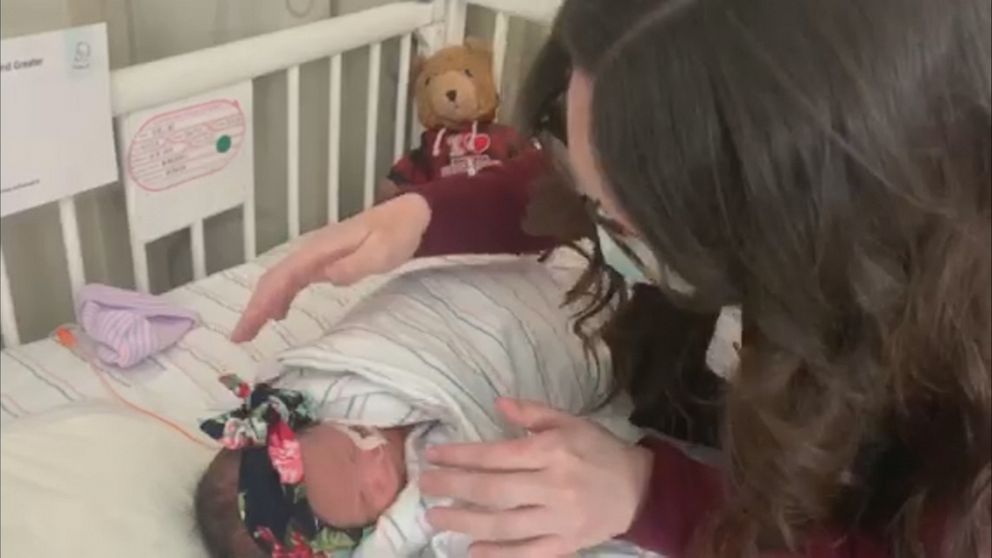
But then, just days later, the news got even better for the Fadayomis. Their daughters were coming home.
Again, Gerald turned on his camera as the family left the hospital, thanking health care workers for everything they’ve done so the family could begin their new life.
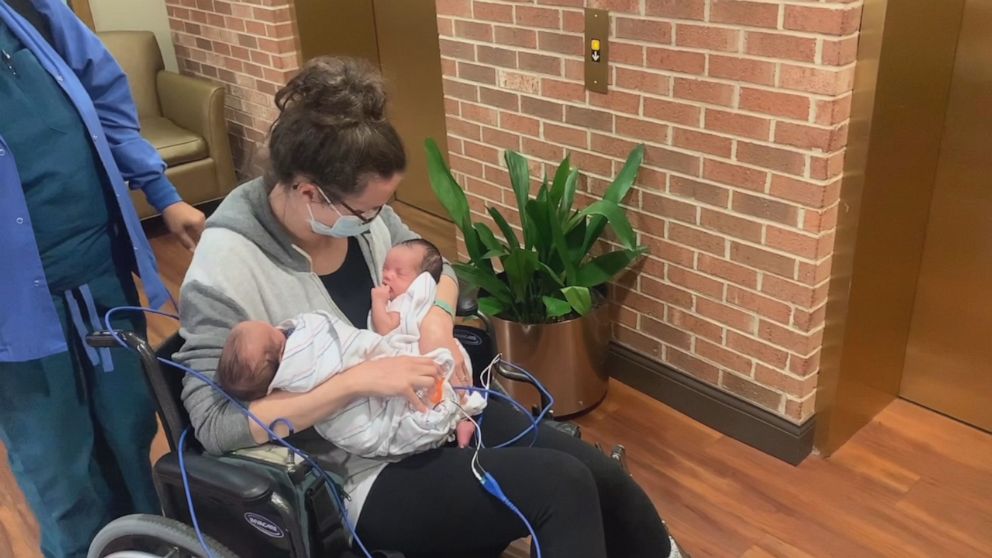
“Part of the only reason that we're telling our story is just to try to help people understand, like, this is hard for our family… But there are nurses and doctors and hospital workers who are literally risking their own lives and risking the safety of their families to take care of our family,” Gerald Fadayomi said. “More than anything, we're just so grateful for them and for the way that they've cared for us.”
The Scheers, Millers and DeFilippos also expressed their immense gratitude to the health care workers who helped deliver hope into this new world.
“Thank you for continuing to put yourself in the line of fire every single day,” Emily Scheer said.
“From the doctors to the nurses to those who scrub the floors,” Janelle Miller said -- “Thank you. Thank you. Thank you. Thank you. We appreciate you,” Warner Miller added.
“Every 7 p.m. since he's been born, he's been pulling out the pots and pans and hooting and hollering,” Karli DeFilippo said of her newborn Joaquin. “We just appreciate them so much for what they did for us personally and what they're doing, you know, for our nation to keep us all safe.”



